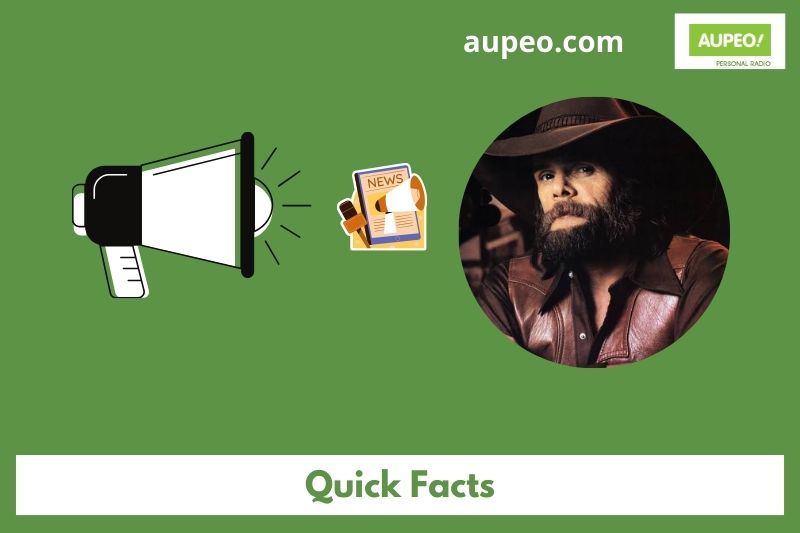Johnny Paycheck was one of country music’s most recognizable names, famous for his outlaw image and timeless hit Take This Job and Shove It.
Over the years, he made millions through music, touring, and songwriting. But financial troubles, legal issues, and IRS debt dramatically affected his fortune.
In this article, Aupeo takes a deep dive into Johnny Paycheck net worth, exploring how he made his money, the financial setbacks he faced, and what he left behind.
Johnny Paycheck Quick Facts

| FACT | DETAIL |
|---|---|
| Real Name | Donald Eugene Lytle |
| Popular Name | Johnny Paycheck |
| Birth Date | May 31, 1938 |
| Age | 64 (Died:February 19, 2003 ) |
| Birthplace | Greenfield, Ohio, U.S. |
| Nationality | American |
| Ethnicity | Caucasian |
| Education | N/A |
| Marital Status | Married |
| Spouse | Sharon PayCheck (m. 1969–2003) |
| Children | John PayCheck |
| Dating | N/A |
| Siblings | N/A |
| Parents | N/A |
| Height | 1.65 meters |
| Net Worth | N/A |
| Source of Wealth | Music royalties, songwriting, performances |
What is the Net Worth of Johnny Paycheck in 2025?

Johnny Paycheck’s exact net worth remains undisclosed, but his financial journey was a rollercoaster.
At his peak, he made millions from record sales, songwriting royalties, and live performances. However, tax issues, lawsuits, and time in prison significantly reduced his fortune.
Compared to his peers in the outlaw country movement, Paycheck’s financial struggles were more pronounced. While icons like Willie Nelson and Waylon Jennings faced their own IRS troubles, they managed to recover. Paycheck, however, never fully bounced back.
Here are some notable figures related to his career and financial history:
- Willie Nelson
- Waylon Jennings
- Merle Haggard
- David Allan Coe
- George Jones
- Sony Music
- Epic Records
- Grand Ole Opry
- Billy Sherrill
- Country Music Association
For a broader look at high-earning musicians and entertainers, check out this comprehensive list of wealthy public figures: Check out the wealthiest stars today.
Johnny Paycheck Wealth, Salary, and Financial Overview

How Did He Earn His Money?
Johnny Paycheck’s primary income sources were music sales, songwriting royalties, and live performances. He gained fame in the 1970s with hits like Take This Job and Shove It, which sold over 2 million copies.
He worked with Sony Music and Epic Records, signing contracts that provided substantial earnings.
He also co-wrote major songs, including Once You’ve Had the Best for George Jones, earning royalties for years.
Additionally, he co-owned Little Darlin’ Records, a label that released his early music. Unfortunately, the label folded, limiting his financial success.
What Were His Biggest Financial Challenges?
Despite his success, Johnny Paycheck faced serious financial struggles. His IRS debt, estimated at $300,000, led to bankruptcy in 1990.
Legal issues also took a toll. In 1985, he was sentenced to seven years in prison for shooting a man, though he served only 22 months before being pardoned. This legal battle drained his earnings and impacted his career.
In addition to tax problems, he struggled with substance abuse, leading to erratic behavior and lost opportunities.
His financial problems mirrored those of Willie Nelson, who also faced IRS troubles but managed to recover.
How Did His Financial Situation Change Over Time?
Johnny Paycheck experienced financial highs in the late 1970s, earning significant royalties from his hit songs.
However, by the 1980s, his legal troubles, addiction, and poor financial management led to a decline.
By the 1990s, his career had slowed, and his bankruptcy filing confirmed his financial troubles. Unlike peers such as Merle Haggard, who managed their finances better, Paycheck struggled to sustain his earnings.
What Role Did Record Labels Play in His Finances?
Johnny Paycheck was signed to Epic Records and later worked with Sony Music, both of which played a key role in his financial journey.
His partnership with producer Billy Sherrill helped him achieve mainstream success, but it also meant sharing royalties.
His attempt at financial independence with Little Darlin’ Records ended in failure, as the label folded due to financial mismanagement.
Did He Leave Behind Any Wealth?
When Johnny Paycheck passed away in 2003, his financial situation was uncertain. He had no known major assets, and reports suggest that George Jones helped pay for his burial.
His estate likely continues to earn from music royalties, but public records do not specify how much. His family, including his son Jonathan Paycheck, may still benefit from residual earnings.
Conclusion
Johnny Paycheck’s financial journey was a mix of success and hardship. While he earned millions during his career, legal issues, tax problems, and poor financial management led to major setbacks.
His story serves as a reminder of how quickly fortune can change in the entertainment industry.
What do you think of Johnny Paycheck’s financial ups and downs? Leave a comment, share this article, or explore more celebrity financial insights at Aupeo.com.

